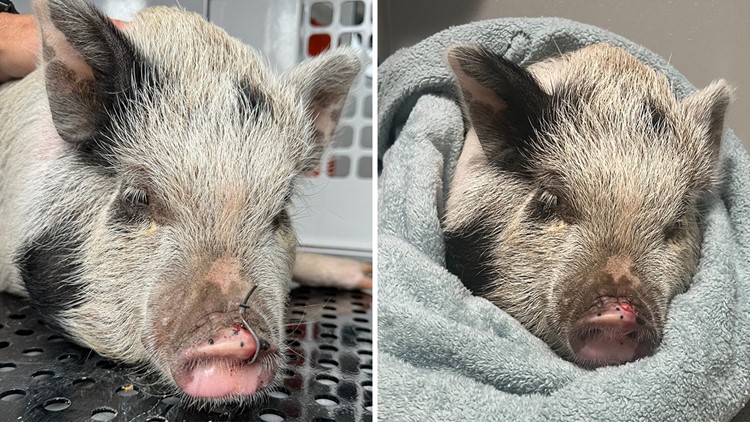TAMPA, Fla. — An adorable 5-month-old potbellied pig was adopted after being found with a gruesome injury.
The pig, named Helga, was found with a piece of metal "horrifically" shoved in her snout.
The Humane Society of Tampa Bay (HSTB) says Helga was brought to them from an unspecified residential neighborhood. The organization explained that the metal in her snout was there "to stop her from rooting."
According to the American Mini Pig Association, rooting is a natural behavior for pigs where they use their snout to push or nudge into something repeatedly. They'll do so for a number of reasons, including for comfort, communication, to cool off or to find food.
A veterinarian team treated Helga and HTSB says they were able to remove the metal from her snout. Sadly, the shelter added that "it was noticeable how sad she was."
Fortunately, Helga will make a full recovery. Since she was placed in HTSB's care, she found her forever home. HTSB said on its Facebook page that a woman named Sherri, "a huge animal lover who rescues farm animals and brings them to live their best lives on her 10 acres," adopted Helga.
"We just know Helga will be right at home frolicking and rooting with her new friends."
At the time of Helga's injury, the humane society used it as an opportunity to educate people on what it takes to raise a pig as a pet.
"With any animal, pigs require specialized care so please do your research on their requirements to ensure you are ready with the right space, food, enrichment, medical care, etc., and understand their natural personality for the 15-18 year average lifespan," HTSB advised in a Facebook post.
Potbellied pigs are often found as "pampered pets living indoors," and they can weigh roughly around 120 to 150 pounds, according to Texas A&M University's Veterinary Medicine & Biomedical Sciences.
They're known to be very intelligent and can even be housebroken, adding to their allure for potential pet owners. They're also able to "openly express their fondness for their owners, much like other domesticated house pets."
But, as HTSB also pointed out, Dr. Kevin Washburn, an associate professor at Texas A&M, reiterates that they're most suitable for someone "who has time to devote to caring for the animal and who is prepared financially to provide veterinary care."



